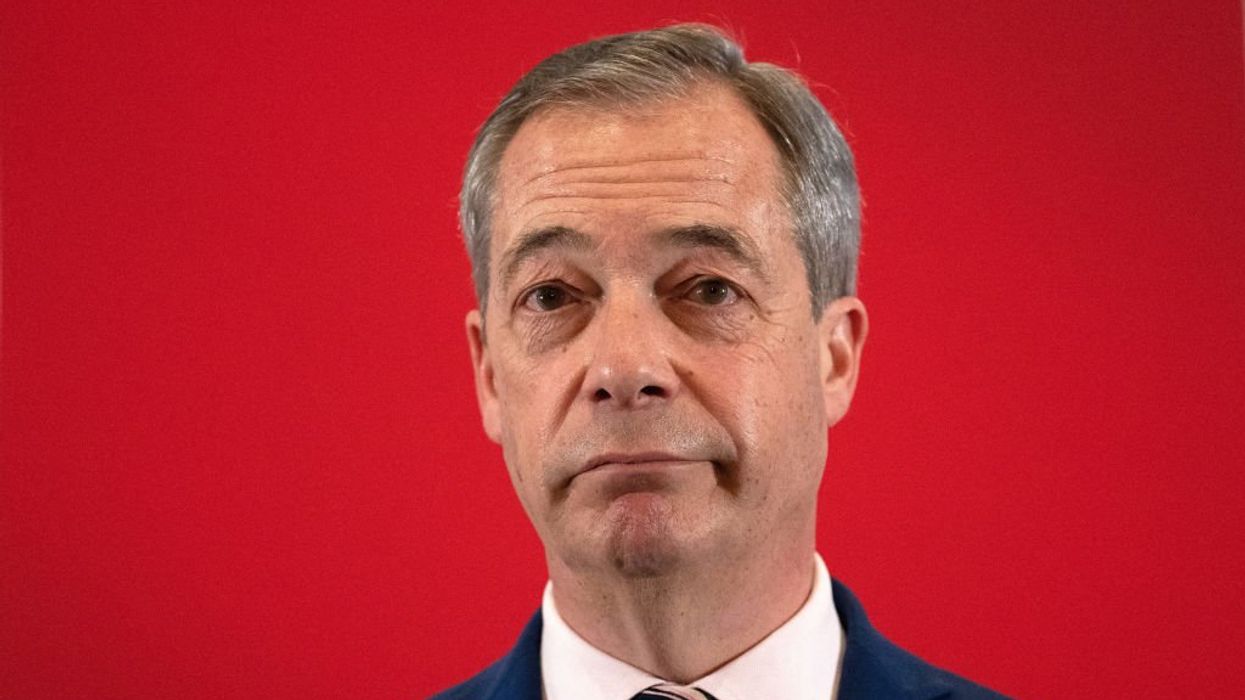
Photo by Carl Court/Getty Images

Nigel Farage, the former English politician who proved instrumental in the 2020 restoration of British sovereignty via Brexit, obtained documents this week revealing that his de-banking by Coutts was grossly political in nature.
According to the Telegraph, Coutts bank, part of the NatWest Group, previously indicated to the BBC and the Financial Times that Farage's account had been closed for financial reasons.
That claim has since crumbled, resulting in an apology — not from the media outlets who got it wrong but from the head of the bank.
Farage recently obtained a damning 40-page file from Coutts bank via a "subject access request," which was subsequently published in its entirety by the Daily Mail.
The document, which had been presented to the bank's wealth reputational risk committee in November 2022 and focused on Farage's "controversial profile in public life and politics," acknowledged he was a commercially-viable customer, contrary to the bank's earlier suggestion.
Notwithstanding his viability, the document provided a number of politically charged reasons why Coutts would be best off closing Farage's account and "exiting" him upon the expiry of his mortgage, even though "it is very likely that the client would 'go public.'"
While admitting that there was "nothing substantive" to shore up allegations that he might have unbecoming "Russian connections," the document stressed that he had made a number of "public comments that created an increased reputational risk of Coutts continuing to bank with him."
Among the remarks, social media posts, and stances Farage took that got the bank 's dander up were:
The document further insinuated that Farage could be regarded as a "disingenuous grifter" with "xenophobic, chauvinistic and racist views."
Farage, who previously suggested his de-banking amounted to "political persecution," responded to the document, calling it "astonishing, it's abusive and it makes a whole series of wildly false statements about Russia while acknowledging I have not been convicted of anything."
He further characterized the bank document as a "Stasi-style surveillance report."
Suealla Braverman, a British Conservative member of Parliament and Home Secretary, noted Wednesday, "The Coutts scandal exposes the sinister nature of much of the Diversity, Equity & Inclusion industry Apparently anyone who wants to control our borders & stop the boats can be branded 'xenophobic' & have their bank account closed in the name of 'inclusivity.'"
Braverman suggested that other organizations "who have naively adopted this politically biased dogma need a major rethink."
Following similar denunciations from other parliamentarians, Alison Rose, the chief executive of NatWest Group, apologized to Farage Thursday, writing, "I am writing to apologise for the deeply inappropriate comments about yourself made in the now published papers prepared for the Wealth Committee. ... I would like to make it clear that they do not reflect the view of the bank," reported GB News.
"I believe very strongly that freedom of expression and access to banking are fundamental to our society and it is absolutely not our policy to exit a customer on the basis of legally held political and personal views," added Rose. "To this end, I would like to personally reiterate our offer to you of alternative banking arrangements at NatWest."
Farage responded on Twitter, writing, "Dame Alison Rose’s apology is a start, but it is no more than that. She needs to take responsibility as CEO, and is wrong to say the views of her own committee’s report don’t reflect the bank. I will now defend thousands of other people that have been de-banked on her watch."
It appears neither the BBC nor the BBC reporter, Simon Jack, who originally peddled Coutts' false claims about Farage's cancellation, have yet apologized to the Brexiteer.
The Sunday Times reported that following the revelation that Farage's politics likely played a determining factor in his de-banking, NatWest will soon be faced with an avalanche of requests from tens-of-thousands of similarly de-banked customers to know why they were kicked to the curb.
De-banking is not a uniquely British phenomenon.
JPMorgan Chase canceled the faith-based nonprofit National Committee for Religious Freedom's checking account last year, reported the Christian Post.
Sam Brownback, NCRF chairman and former Trump ambassador-at-large or international religious freedom, indicated there was "never an official cause given" or forewarning for the account closure.
NCRF Executive Director Justin Murff posed the question, "If they can 'de-bank' the NCRF, a multi-faith religious nonprofit, what happens when they start 'de-banking' pastors and Christian business people?"
Sen. Marco Rubio (R-Fla.) subsequently penned a letter to the bank's CEO, Jamie Dimon, stating, "I have previously noted my grave concern with politically-motivated de-banking. Bank decisions should be made using impartial risk standards to determine credit worthiness, not arbitrary political or ideological concerns."
Nebraska State Treasurer John Murante (R) wrote an opinion piece in Newsweek in March, highlighting how Chase "has denied payments or canceled accounts associated with people and organizations—such as former ambassador Sam Brownback, the Arkansas Family Council, Defense of Liberty, and retired general Michael Flynn, Jr—for holding mainstream American views. In fact, a former Chase executive described the bank's practice of 'red-dotting,' where Chase employees can flag customers for cancelation based on their perceived reputational or social risk."
Murante added, "When powerful banks like Chase retain unbridled discretion to cancel accounts for arbitrary or biased reasons, it undermines the freedom of everyday Americans to participate in society and the marketplace without fear of discrimination based on their political or religious views."
Like Blaze News? Bypass the censors, sign up for our newsletters, and get stories like this direct to your inbox. Sign up here!